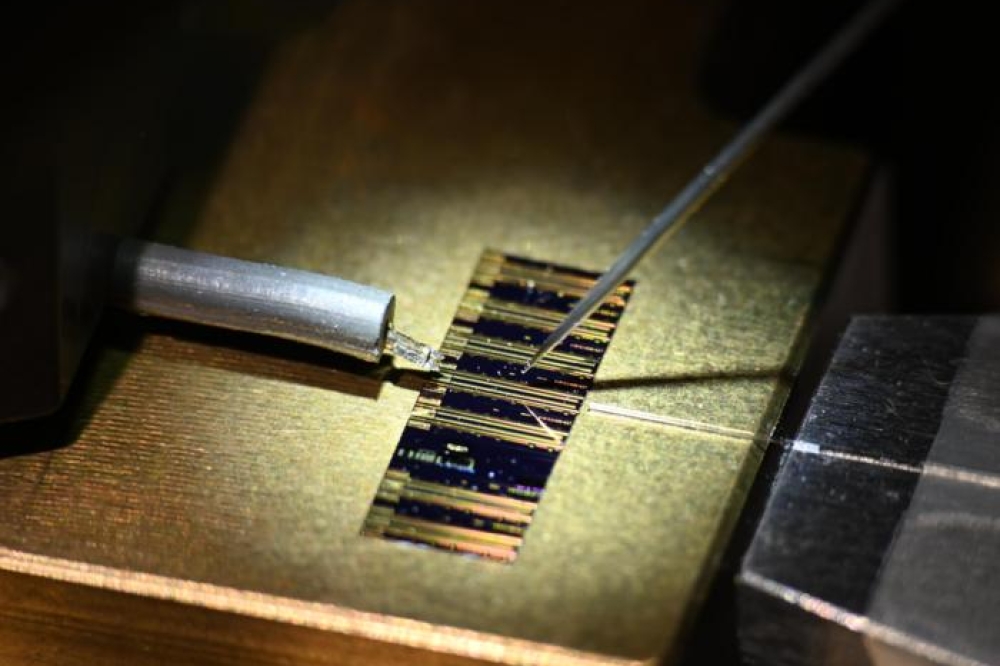News Article
Opel makes breakthrough with POET based n- and p-transistors
The result builds on the previous GaAs (gallium arsenide) based VCSEL milestone. It is a further verification that III-Vs can compete with silicon CMOS in WDM capable optoelectronic devices and functions, FETs and bipolar devices
Opel Technologies has achieved Milestone 4 in its Planar Optoelectronic Technology (POET), achieving radio frequency and microwave operation of both n-channel and p-channel transistors.
With this achievement, POET extends the capability of its unique monolithic platform to cover integration of a complete range of wavelength-division multiplexed (WDM) capable optoelectronic devices and functions.
This is in addition to complementary electronics based on n-channel and p-channel transistors as either field effect transistors (FETs) or bipolar devices.
For this milestone, 3inch POET wafers fabricated at BAE Systems (Nashua, NH) yielded submicron n-channel and micron-sized p-channel transistors operating at frequencies of 42 GHz and 3 GHz respectively. These operating frequencies are expected to be improved even further in the short term to up to 300-350 GHz range for the n-channel device.
Peter Copetti, Executive Director of Opel, notes, "Following the success of our Vertical Cavity Surface Emitting Laser milestone achieved recently, this result further verifies POET's electronic and optical monolithic compatibility, a key advantage of POET as a silicon CMOS replacement. Our on-chip optical generation and detection capability is unique in the semiconductor industry."
Progress on Taylor's work at the Opel lab had been delayed by damage sustained to key equipment during a multi-day power outage caused by Tropical Storm Sandy in late October 2012. However, the rebuild is expected to be completed next week, and the company expects the affected equipment will be recalibrated and operational again by the end of March 2013.
Copetti adds, "Given the calibre of the POET team, we are confident that the lost time will be made up so that it will not have a material impact on the milestone target dates."
At the successful conclusion of the recent private placement fundraising, approximately $1.3 million in new capital equipment was ordered to upgrade the R&D facility capabilities. The company has completed all necessary site infrastructure upgrades and is awaiting the arrival of the new equipment.
Opel expects the new equipment will be installed, calibrated, and commissioned by the end of June, 2013.
By enabling increased speed, density, reliability, power efficiency, and much lower bill-of-materials and assembly costs, POET provides a new technology direction and opportunity for the semiconductor industry.
POET will allow continued advances of semiconductor device performance and capabilities for many years, overcoming the current power and speed bottlenecks of silicon-based circuits,. Opel believes it will change the future development roadmaps of a broad range of semiconductor applications including mobile devices, computer servers, storage arrays, imaging equipment, networking equipment, transportation systems, and test and measurement instruments.
With this achievement, POET extends the capability of its unique monolithic platform to cover integration of a complete range of wavelength-division multiplexed (WDM) capable optoelectronic devices and functions.
This is in addition to complementary electronics based on n-channel and p-channel transistors as either field effect transistors (FETs) or bipolar devices.
For this milestone, 3inch POET wafers fabricated at BAE Systems (Nashua, NH) yielded submicron n-channel and micron-sized p-channel transistors operating at frequencies of 42 GHz and 3 GHz respectively. These operating frequencies are expected to be improved even further in the short term to up to 300-350 GHz range for the n-channel device.
Peter Copetti, Executive Director of Opel, notes, "Following the success of our Vertical Cavity Surface Emitting Laser milestone achieved recently, this result further verifies POET's electronic and optical monolithic compatibility, a key advantage of POET as a silicon CMOS replacement. Our on-chip optical generation and detection capability is unique in the semiconductor industry."
Progress on Taylor's work at the Opel lab had been delayed by damage sustained to key equipment during a multi-day power outage caused by Tropical Storm Sandy in late October 2012. However, the rebuild is expected to be completed next week, and the company expects the affected equipment will be recalibrated and operational again by the end of March 2013.
Copetti adds, "Given the calibre of the POET team, we are confident that the lost time will be made up so that it will not have a material impact on the milestone target dates."
At the successful conclusion of the recent private placement fundraising, approximately $1.3 million in new capital equipment was ordered to upgrade the R&D facility capabilities. The company has completed all necessary site infrastructure upgrades and is awaiting the arrival of the new equipment.
Opel expects the new equipment will be installed, calibrated, and commissioned by the end of June, 2013.
By enabling increased speed, density, reliability, power efficiency, and much lower bill-of-materials and assembly costs, POET provides a new technology direction and opportunity for the semiconductor industry.
POET will allow continued advances of semiconductor device performance and capabilities for many years, overcoming the current power and speed bottlenecks of silicon-based circuits,. Opel believes it will change the future development roadmaps of a broad range of semiconductor applications including mobile devices, computer servers, storage arrays, imaging equipment, networking equipment, transportation systems, and test and measurement instruments.































